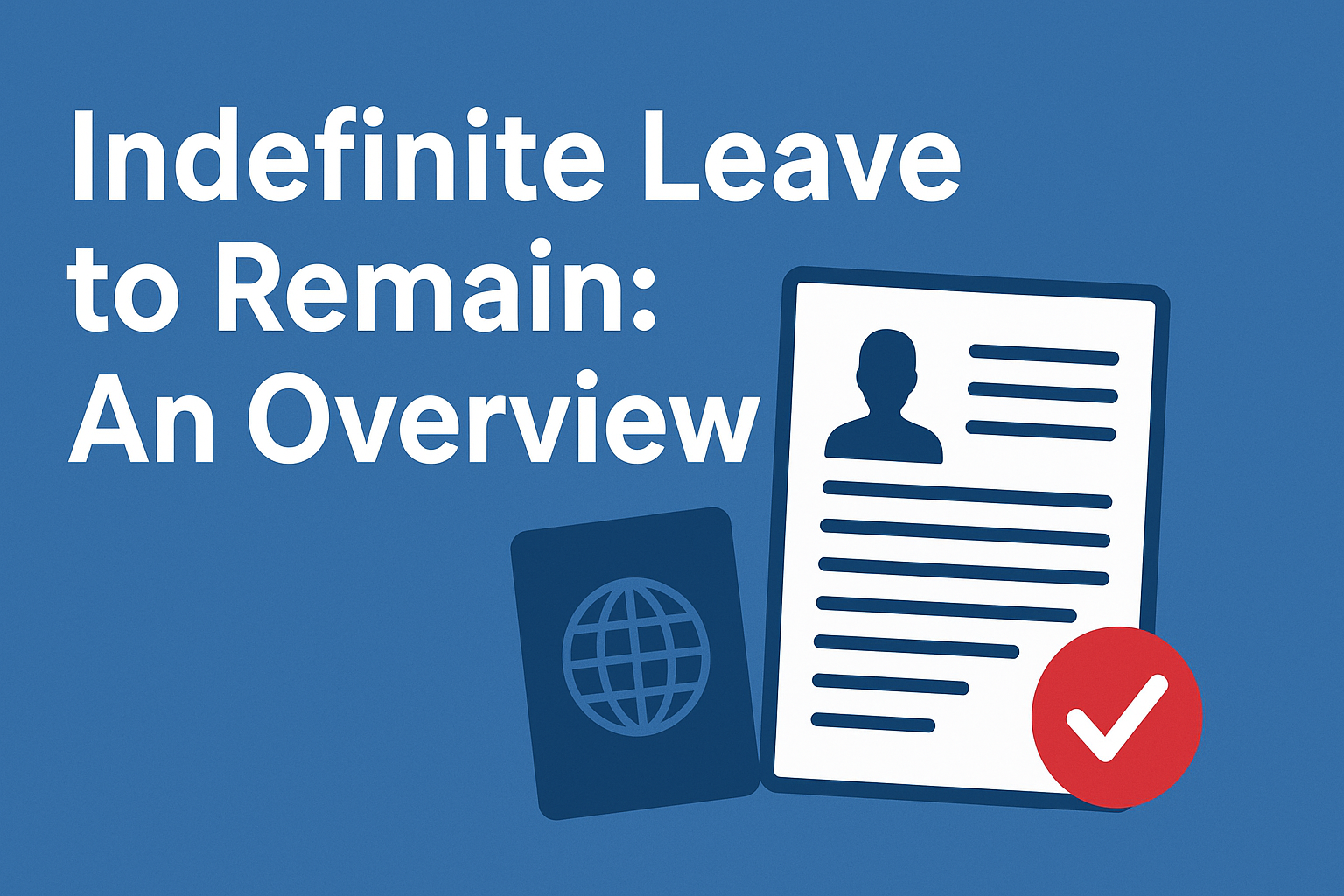Indefinite Leave to Remain (ILR) is the status that gives people the right to stay in the UK permanently. It means freedom from visa renewals, access to work and public services, and a clear route to British citizenship. For many, it marks the point where short-term uncertainty turns into long-term stability.
Understanding how ILR works, who can apply, and what it provides is key for anyone planning to make the UK their home. This article sets out the essentials in plain terms to help you prepare with confidence.
What Does ILR Actually Mean?
Indefinite Leave to Remain is permission granted by the Home Office that allows a person to stay in the UK without time restrictions. Unlike temporary visas, it does not expire after a set number of years, provided the person continues to meet the rules around residence and conduct.
The status also brings access to the NHS, education, and, in certain circumstances, public funds such as pensions or benefits. Importantly, ILR does not make someone a British citizen. However, it is the recognised route to citizenship, and most applicants can apply to naturalise as a British citizen one year after gaining ILR.
For many people, indefinite leave to remain represents the point at which temporary stay in the UK becomes permanent. It provides peace of mind and allows individuals and families to build their lives in the UK without constant concern about visa renewals.
Why People Apply for ILR
ILR is often described as the stage where life in the UK feels settled. Applicants pursue it for several reasons:
- Stability and security: Having ILR means you are no longer tied to the expiry date of your visa. This allows long-term planning for family, work, or property.
- Employment and study freedom: With ILR, there are no restrictions on the type of work you can take or the courses you can study. You are treated in the same way as a permanent resident.
- Access to public services: ILR holders can use the NHS, send their children to state schools, and, if eligible, apply for certain public funds.
- Travel flexibility: You can enter and leave the UK without the need to reapply for visas, although ILR can lapse if you stay abroad for more than two years continuously.
- Step towards citizenship: For many, ILR is the essential stage before applying for British nationality, which requires at least one year of holding ILR in most cases.
In short, ILR is not just about immigration control. It is about providing individuals and families with the foundation to fully participate in British society.
Routes That Lead to ILR
There is no single route to ILR. The qualifying period and conditions depend on the type of visa you hold. The main routes include employment-based visas, family or humanitarian routes, long residence, and certain other categories.
Employment-Based Routes
- Skilled Worker, T2, International Sportsperson, and Scale-up visas: Holders of these visas can normally apply for ILR after five years of continuous lawful residence, provided they meet salary and sponsorship requirements at the time of application.
- Innovator Founder and Global Talent visas: These categories provide a shorter route, with eligibility after three years for those who can demonstrate they meet the requirements linked to business growth or recognised talent.
- UK Ancestry visa: Holders of this visa, usually Commonwealth citizens with a UK-born grandparent, can apply for ILR after five years of continuous residence.
Family and Protection Routes
- Partner or spouse visa: If you are married to, or in a long-term relationship with, a British citizen or a person with ILR, you can apply for settlement after five years, provided you meet the financial and relationship requirements throughout.
- Refugee or Humanitarian Protection status: Those who have been granted refugee status or humanitarian protection may qualify for ILR, depending on their circumstances and the length of time they have held protection.
Long-Term Residence Route
The 10-year continuous residence rule allows anyone who has lawfully lived in the UK for ten years on different types of visas to apply for ILR. This is a valuable option for people whose circumstances do not fall neatly into a single category but who have built a long and lawful life in the UK.
Other Categories
There are additional, less common routes that still lead to settlement:
- Representatives of overseas businesses.
- Former members of the Armed Forces.
- Certain discretionary or exceptional categories where leave has been granted outside the Immigration Rules.
These routes are often specific and require specialist advice, but they remain an important part of the ILR framework.
General Criteria Every Applicant Must Meet
While each visa category has its own route to ILR, there are core conditions that apply to almost everyone. These requirements ensure applicants show genuine commitment to the UK and meet the legal standards set by the Home Office.
Continuous Residence
Applicants must show they have lived in the UK without extended absences. The usual rule is that you cannot spend more than 180 days outside the UK in any 12-month period during the qualifying years. This test applies across most visa routes. Time away for serious reasons, such as medical care or official employment overseas, may be considered, but strong evidence is essential.
Life in the UK Test
Most applicants between the ages of 18 and 64 must pass the Life in the UK Test. It is a computer-based exam with 24 multiple-choice questions on British history, culture, and laws. The pass mark is 75%, and the test must be booked through an approved centre. A pass certificate is required as part of the ILR application.
English Language Requirement
Applicants usually need to show English language skills at level B1 or higher. This can be proven through an approved test, a degree taught in English, or citizenship from a majority English-speaking country. Those under 18 or over 65 are exempt.
Good Character Requirement
A record of serious criminal convictions, immigration breaches, or unpaid debts to the Home Office can prevent approval. The Home Office assesses the applicant’s character and conduct when deciding the case.
The Step-by-Step Application Journey
The ILR application process is managed online and requires careful preparation. Each stage matters, and missing information can lead to delays or refusals.
Step 1: Check Eligibility
Before applying, confirm that the qualifying residence period has been met and that all requirements specific to your visa category are satisfied. Applications can be submitted no earlier than 28 days before the end of the qualifying period.
Step 2: Gather Documents
Supporting evidence is critical. Typical documents include:
- Current and previous passports used in the UK.
- Biometric Residence Permit (BRP), if issued.
- Proof of residence, such as tenancy agreements, bank statements, or utility bills.
- Evidence of employment or business activity, depending on the visa route.
- English language certificate and Life in the UK Test pass notification.
Step 3: Apply Online
Applications are submitted through the UK Government website. The form varies depending on the visa route, so care must be taken to choose the correct application type.
Step 4: Provide Biometrics
Applicants are required to attend an appointment at a UK Visa and Citizenship Application Services (UKVCAS) centre. Fingerprints and a photograph are taken to confirm identity.
Step 5: Await the Decision
The standard processing time is around six months, though priority and super-priority services may be available at an additional cost. If the application is successful, the applicant will receive an electronic visa (eVisa) and, in many cases, a replacement BRP.
When ILR Status Can Be Lost?
Although ILR is described as permanent residence, it can lapse or be taken away in certain circumstances.
Extended absence from the UK: If an ILR holder leaves the UK for more than two continuous years, the status will usually lapse automatically. In such cases, an application for a Returning Resident visa may be needed to re-enter the UK.
Deportation or criminal conduct: ILR can be cancelled if the holder commits a serious offence and is subject to deportation.
Deception in the application: If ILR was obtained using false information or documents, the Home Office can invalidate the status.
These rules highlight the importance of maintaining lawful conduct and keeping ties to the UK even after ILR is granted.
FAQs
Can I apply for ILR if I have spent time on different visas?
Yes. Time on different visa types can often be combined if you are applying under the 10-year continuous residence route. For other categories, only time spent on a qualifying visa will count, so it is important to check which periods are valid before applying.
Do children need to meet the Life in the UK Test requirement?
No. The Life in the UK Test only applies to applicants aged 18 to 64. Children under 18 can usually apply for ILR at the same time as their parents, provided they hold valid immigration status and meet the relevant requirements.
Read also: Different Styles of Wedding Veils
Can I include dependants in my ILR application?
Yes. Spouses, partners, and children can often apply at the same time if they have lived in the UK under an eligible visa. Each dependant must meet their own requirements, such as residence and relationship evidence, and pay the application fee.
Does time spent abroad on business trips affect ILR eligibility?
Business-related absences can count towards the 180-day limit in a 12-month period, but they do not automatically prevent ILR. If you can show the travel was required by your UK-based employer and you maintained residence here, the Home Office may accept the absences as valid.
What happens if my ILR application is refused?
If ILR is refused, you may be able to request an administrative review or appeal, depending on the reason given. In some cases, applying under a different visa category may be the practical option. Legal advice is recommended to decide the best course of action.


